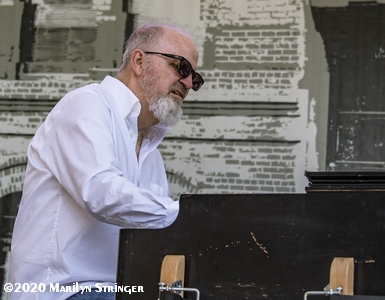What do These artists all have in common: Kid Andersen, Diunna Greenleaf, Jim Pugh, Curtis Salgado, Mike Finnigan, Kevin Burt, Chris Cain, Alura Chavez, Wee Willie Walker, Nancy Wright, Larry Fulcher, June Core and Derrick “D’Mar” Martin?
They’ve all been Blues Music Award winners and/or are this year’s nominees. They also have enjoyed increased public attention from recordings they’ve made for Little Village Records.
“We’re really just trying to peddle awareness,” says label CEO Jim Pugh, himself Robert Cray’s keyboardist for 25 years and before that with Etta James. “I figure the more people who know who you are, the more opportunity you’re going to have to be in the position to make money whether it’s doing gigs for the few people out there buying music, it’s a better circumstance.”
Little Village is a 501c3 nonprofit record company whose stated mission is “to support the dreams of artists from nontraditional backgrounds, who are working in genres with deep roots in American culture.” They “seek to shine the light of awareness on musicians that might not otherwise be heard, and in doing so further the idea that a life filled with diverse music builds empathy making for stronger communities and a better world.” Their diverse artist roster and variety of music genres represented by the label including mariachi, folk, blues, gospel, rock, spoken word, roots, soul, and more.

Read my review of Diunna Greenleaf’s new album I Ain’t Playin’ here in American Blues Scene for an inkling of how significant Little Village is to blues, a genre that constantly struggles to maintain a sustaining fan base for so many great artists.
“I worked for Robert Cray for 24 years and eight months. I call it 25 years,” explains Pugh. “Before that, I worked for Etta James for (10 years). I really got to the point at 60 where I just decided to combine my passions. The point being, if you do something you really like doing, it’s not work at all.”
Jim Pugh started Little Village in 2014. “Little Village was going to be four releases a year and separately we would go from four artists one year to four artists the next year. Well, it turned out to be somewhat more like eight to 10 releases in one year, and it’s not separate year to year. I’m working with artists from four to five years ago. It’s cumulative. So, the thing isn’t getting smaller. It’s getting bigger. It’s still my passion. I spend a lot of days being in my pajamas from 7 o’clock in the morning to 7 o’clock at night, and then some. It’s a lot of work.”
The pandemic has separated the winners from the losers in the music business. Little Village is one of the winners. “Either we’ve grown because of the pandemic or we’re just grown,” says Pugh. “Business is good. I’m not really in the business of making people into superstars. I don’t have any idea how that works, and I’ve pretty much been involved in antiquated forms of music since I was a teenager.
“You know Muddy Waters’ Greatest Hits came out in 1959. How the “record industry” is having to change is difficult. We’re just lean and mean. We do things pretty fast, and we’ve got really good p.r. people. But (Grateful Dead historian and publicist) Dennis McNally got involved all the way. We were talking, and he goes, ‘Are you a Deadhead?’ And I go no. He goes, ‘Good!’ It really bogs him down because people want to talk to him about Dark Star.”
Kid Andersen and his Greaseland studios also have been involved in many Little Village recordings. Andersen has been quoted as saying, “To me the studio is a musical instrument, and I treat it and think of it that way.” He was in the house band at the Muddy Waters Club in Norway in the ’90s and became Charlie Musselwhite’s lead guitarist in 2005. He recorded with Charlie on Delta Hardware which garnered four Blues Music Awards. His Greaseland Studio has produced Rick Estrin & The Nightcats’ One Wrong Turn (2012) and Groovin’ in Greaseland (2017) and Stompin’ Ground from Tommy Castro in 2019 to name three.

His studio has released more than 50 records by the likes of Wee Willie Walker, John Boyd, Finis Tasby, Little Charlie, Frank Bey, Anthony Paule, Aki Kumar, Rockin’ Johnny Burgin, Jackie Payne, John Németh, Terry Hanck, and Mark Hummel. In other words, he’s the go-to cat.
“We’re having a good time,” states Pugh flatly. He’s particularly proud of his work on Diunna’s new album. “I think you’re doing an interview with Diunna is fabulous. She’s a wonderful person. She’s an icon of female blues singers. They’re just not that many of them. There haven’t been historically.:
Pugh compares Diunna to the late Queen of the Blues Koko Taylor. “I hired Koko Taylor to play when I was 15 at my high school dance in 1969. Me and my group of friends all had older brothers and sisters, and some of them went to the University of Chicago, and starting in the mid-’60s, early ’60s I was listening to my friend’s sister’s records: Paul Butterfield and from that to Howlin’ Wolf and Muddy Waters. We started at a really young age. We’d take the L and buy records from Bob Koester (owner of Chicago’s Jazz Record Mart and founder of Delmark Records).
“When I was in high school. they said, ‘You gotta have an activity.’ I said, ‘I’ll be on the dance committee,’ and so I called Bob Koester and said, ‘We want to hire somebody to play,’ and he hooked up a call with Willie Dixon.
“I called Willie Dixon on the phone, and he was managing Koko Taylor. Then years later at the Santa Cruz Blues Festival, his widow was there. She goes, ‘I remember when you made that call. I answered the phone.’”
Just getting up and running can be difficult for today’s blues artists. Diunna Greenleaf was in her lates 30s before she got into the business. Little Village gives such artists a head start. “I’ve done small projects before, but this was really something like starting your own company,” says Pugh. “I’ve read that on sort of the entrepreneurial thing that happens with most people when they start companies for example the couple in Texas. The guy was a welder, and she was good at marketing, and so they made backyard furniture, and they took out an ad in Teaxas magazine, and they got so many orders that they went out of business. I mean he got overrun by the business, and that’s a common thing.”
That’s not likely to happen with Little Village. With the growing fan base for the label’s artists, the blues has a bright future.


